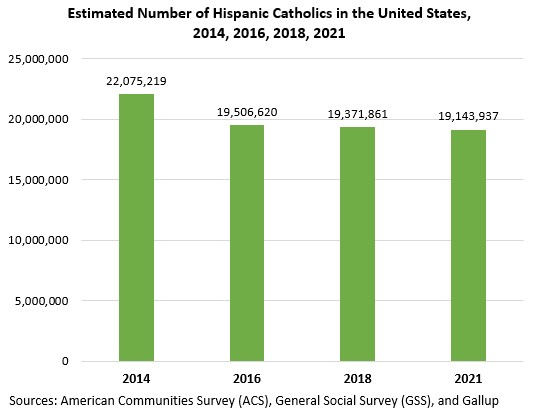The Catholic affiliation percentage among Hispanics in the United States has been in decline for the last 15 years. In 2006, 69% of Hispanic adults self-identified as Catholic in the General Social Survey (GSS). In 2021, the Catholic affiliated percentage had declined to 49%. Increasing numbers of Hispanics are identifying as a non-Catholic Christian or as not having any religious affiliation.
With this decline in affiliation, the share of Catholics who are Hispanic has remained within the 33% to 37% range in the last 15 years. This has occurred while the Hispanic population has grown in the United States. The decline in affiliation among the growing population has meant there is not a lot of change in the share of adult Catholics who self-identify as Hispanic. In 2021, 34% of Catholic adults were Hispanic. Since 2016, the total estimated number of Catholics who are Hispanic has exceeded 19 million (assuming children have similar affiliation percentages to their parents).
In 2019, the Pew Research Center asked a national sample of 3,030 Hispanics about how important aspects of life were to “what being Hispanic means to you.” “Being Catholic” is not an aspect that is considered important by many Hispanics. Sixteen percent of Hispanics said this was “essential” and 23% “important but not essential.” Fifty-nine percent said this was “not an important part of what being Hispanic means to me.”
“Being Catholic” was just one of many things respondents were asked about. The item most associated with being “essential” is “speaking Spanish” (45%) followed by “Hispanic Heritage or descent” (32%), and “socializing with Hispanics” (29%).
One of the biggest contributors to this change in Hispanics is the drop in the retention rate for young Hispanics who were raised Catholic. According to the 2006 GSS, 82% of Hispanics raised Catholic remained Catholic as adults. By comparison, only 66% of those raised Catholic remained in the faith as adults in the 2018 GSS. The retention rate for non-Hispanics was even lower, 63%, in 2018.
Will Catholics in the United States ever be majority Hispanic? Maybe. But it might be awhile and the current declines in retention and affiliation would need to stay steady at rates where they were in 2021. Let me explain.
Let’s say 22% of the U.S. population continues to be Catholic in the future (as it has within a few percentage points positively or negatively since 1945) and 49% of Hispanics self-identify as Catholic. In 2040, 52% of Catholics would be expected to be Hispanic.
The problem with that scenario is that the Catholic affiliation rate among Hispanics may continue to decline. Or maybe not. For example, Italian American affiliation with Catholicism was 89% in 1972 according to the GSS. This declined to 56% in 2010 but has remained stable just above the 50% mark since.
If current trends in Catholic disaffiliation in young Hispanics were to continue, based on linear regression analysis Hispanic affiliation would fall to 22% in 2040. I doubt this will occur. If it did, it would be unlikely that Hispanics ever make up a majority of the Catholic population in the foreseeable future even with significant population growth.




